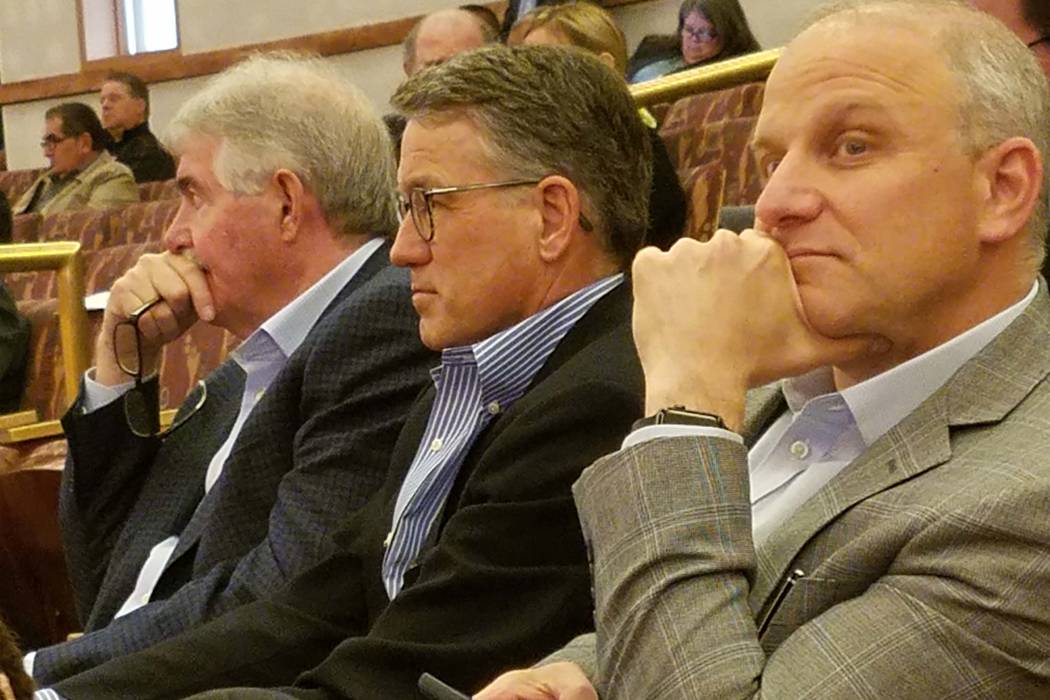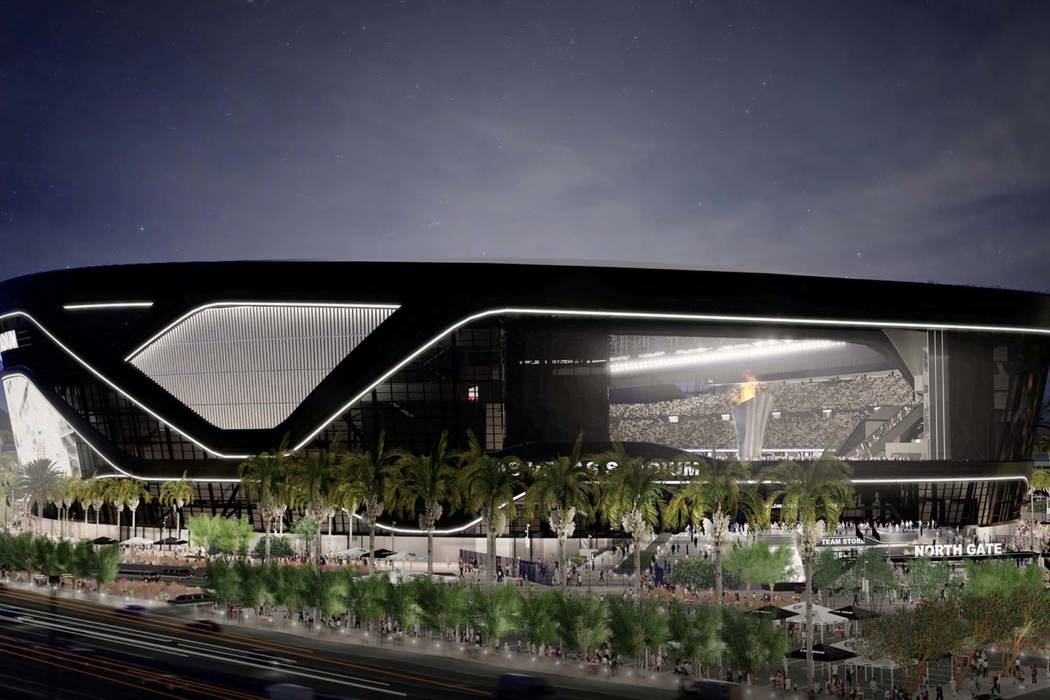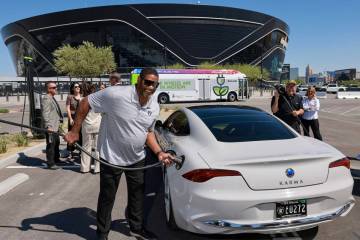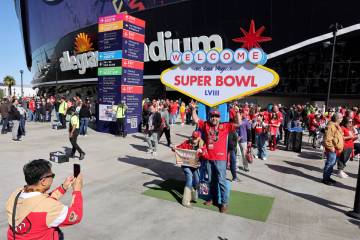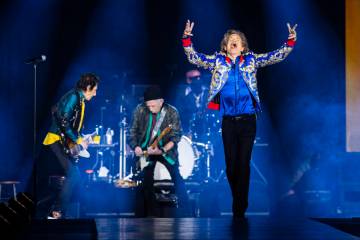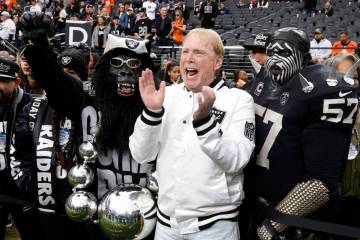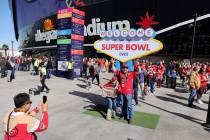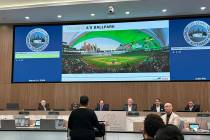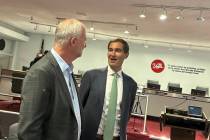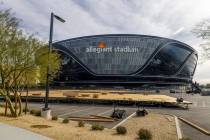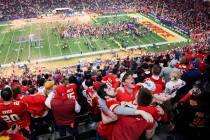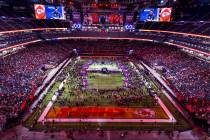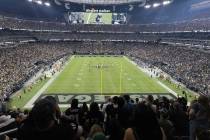Clark County OKs bonds sale for Las Vegas Raiders stadium
Clark County Commissioner Chris Giunchigliani has consistently opposed the public’s $750 million subsidy for the 65,000-seat stadium being built for the Raiders.
Commission Chairman Steve Sisolak and other commissioners have consistently supported it.
Why would anything be different Tuesday as commissioners’ efforts to fund the project neared the finish line?
Commissioners discussed an 86-page bond ordinance for about 40 minutes before voting 6-1 to approve the financing mechanism for the public’s share of the $1.8 billion venue at Interstate 15 and Russell Road.
Developers plan to have the stadium completed in time for the 2020 NFL and college football seasons.
The only drama Tuesday was whether Giunchigliani would join the majority in the interest of board unity. She didn’t. Both sides voiced their political points and then voted the way everyone thought they would. Giunchigliani and Sisolak are seeking the Democratic nomination for governor.
Bond pricing, sale up next
Later this month, the county’s financial leaders will get reports from bond market analysts, assess the market, set an interest rate and sell the bonds through a consortium of seven banks underwriting the sale.
Raiders President Marc Badain; Don Webb, chief operating officer for the Raiders’ StadCo stadium construction subsidiary; and principal-in-charge John Wood of Mortenson Construction, the general contractor for the project, were at the meeting but didn’t make a presentation.
The financially conservative bond package includes numerous safeguards to protect the public’s interest.
The bonds are structured to mature over 30 years with escalating debt service and a debt service coverage ratio 1½ times the forecast payment. Initially, the bond issue will fund a debt-service reserve fund equal to one year of average annual debt service. In addition, available room tax revenue in the future will fund an additional reserve to ultimately achieve a debt-service reserve fund equal to two years of average annual debt service.
The Raiders have signed an agreement that would require them to pay off the bonds according to the planned 30-year payment schedule if they leave, even if the bonds were retired early.
Subsidy opposed
Prior to the vote, Giunchigliani said she has only opposed the size of the public subsidy.
“I have never been opposed to a stadium,” she said. “I love football. Actually, I love the (Chicago) Bears. I’m not opposed to this. I want jobs, but I still remain opposed to the single largest public subsidy in the United States. I know that there’s been coverages, but this public subsidy, it should have gone into other priorities.”
Jeremy Aguero, principal at Applied Analysis, which serves as the staff of the Las Vegas Stadium Authority, testified that the sales, commerce, entertainment and payroll taxes that would result from the presence of the Raiders and the stadium would generate between $40 million and $45 million annually once operations begin.
But Giunchigliani said that because the stadium ultimately would belong to the county, no property taxes would be collected.
“I appreciate that they’re going to pay close to $45 million, but they’re not paying property tax,” she said. “I think there are just some things that should have been looked at, and we shouldn’t be giving away close to $750 million to millionaires.”
She also said she’s concerned about the unresolved parking shortage at the stadium site.
‘Not good public policy’
Giunchigliani drew comparisons to the privately funded T-Mobile Arena.
“Our (Vegas) Golden Knights didn’t ask for a public subsidy, and the new Madison Square Garden (Sphere project) that’s going to go in didn’t ask for a public subsidy, and it’s just very frustrating for me,” she said. “As much as I want this, and I want the jobs and I want the opportunities, it’s not good public policy, and I will be casting a no vote.”
Sisolak and Commissioner Larry Brown countered that the stadium will provide its stated economic development purpose, that thousands of jobs will be provided and the UNLV football team will have a new place to play, which should boost the university’s fortunes.
“At the end of the day, this is good for Las Vegas,” Brown said. “Not only the jobs, but bringing the NFL and NHL and all these other things as we see this renaissance in Las Vegas as the entertainment capital of the world has now added this sports component. This is all good.
“I am 110 percent supportive of this primarily because of the effort the county has put into this in protecting our own, protecting not only the integrity of our organization, but protecting the citizens of Clark County,” Brown said.
Sisolak said the project has been thoroughly reviewed.
“I think every question has been asked and answered numerous times, and you may not like the answer, but the questions have all been asked, and I appreciate that,” Sisolak said. “To me, it’s an enormous shot in the arm for our economy, and the tens of thousands of jobs created on the site is something that is going to live on for a long, long time.”
Future events
Sisolak envisions the stadium becoming a site for big events.
“We saw the (NCAA basketball) Final Four on TV last night, and I think that’s something we have a good chance of having, a Final Four played in that stadium,” he said. “I think we have a great chance at having a Super Bowl played in that stadium. Millions of people will attend events over the life of that stadium in Clark County.”
Contact Richard N. Velotta at rvelotta@reviewjournal.com or 702-477-3893. Follow @RickVelotta on Twitter.



